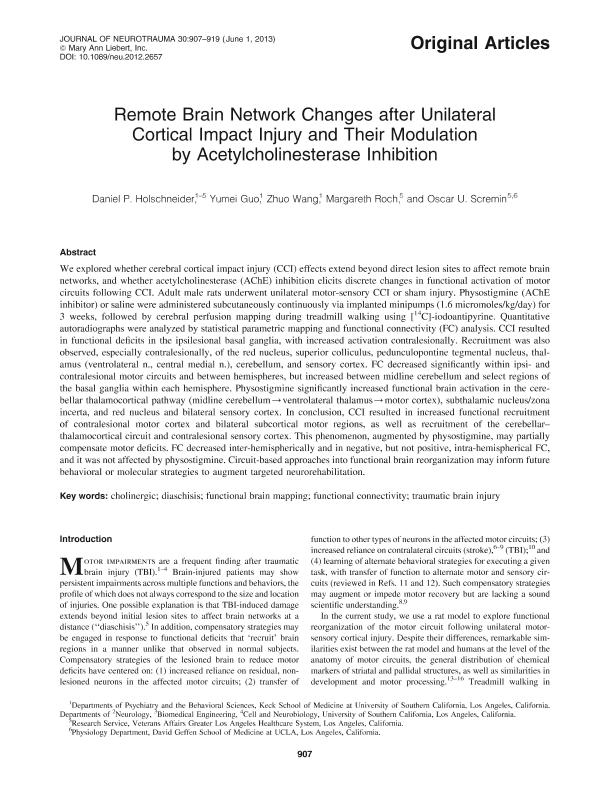Artículo
Remote brain network changes after unilateral cortical impact injury and their modulation by Acetylcholinesterase inhibition
Fecha de publicación:
01/2013
Editorial:
Mary Ann Liebert Inc
Revista:
Journal of Neurotrauma
ISSN:
0897-7151
Idioma:
Inglés
Tipo de recurso:
Artículo publicado
Clasificación temática:
Resumen
We explored whether cerebral cortical impact injury (CCI) effects extend beyond direct lesion sites to affect remote brain networks, and whether acetylcholinesterase (AChE) inhibition elicits discrete changes in functional activation of motor circuits following CCI. Adult male rats underwent unilateral motor-sensory CCI or sham injury. Physostigmine (AChE inhibitor) or saline were administered subcutaneously continuously via implanted minipumps (1.6 micromoles/kg/day) for 3 weeks, followed by cerebral perfusion mapping during treadmill walking using [14C]-iodoantipyrine. Quantitative autoradiographs were analyzed by statistical parametric mapping and functional connectivity (FC) analysis. CCI resulted in functional deficits in the ipsilesional basal ganglia, with increased activation contralesionally. Recruitment was also observed, especially contralesionally, of the red nucleus, superior colliculus, pedunculopontine tegmental nucleus, thalamus (ventrolateral n., central medial n.), cerebellum, and sensory cortex. FC decreased significantly within ipsi- and contralesional motor circuits and between hemispheres, but increased between midline cerebellum and select regions of the basal ganglia within each hemisphere. Physostigmine significantly increased functional brain activation in the cerebellar thalamocortical pathway (midline cerebellum/ventrolateral thalamus/motor cortex), subthalamic nucleus/zona incerta, and red nucleus and bilateral sensory cortex. In conclusion, CCI resulted in increased functional recruitment of contralesional motor cortex and bilateral subcortical motor regions, as well as recruitment of the cerebellar– thalamocortical circuit and contralesional sensory cortex. This phenomenon, augmented by physostigmine, may partially compensate motor deficits. FC decreased inter-hemispherically and in negative, but not positive, intra-hemispherical FC, and it was not affected by physostigmine. Circuit-based approaches into functional brain reorganization may inform future behavioral or molecular strategies to augment targeted neurorehabilitation.
Palabras clave:
Brain Imaging
,
Brain Trauma
,
Rats
,
Autoradiography
Archivos asociados
Licencia
Identificadores
Colecciones
Articulos(CCT - ROSARIO)
Articulos de CTRO.CIENTIFICO TECNOL.CONICET - ROSARIO
Articulos de CTRO.CIENTIFICO TECNOL.CONICET - ROSARIO
Citación
Holschneider, Daniel P.; Guo, Yumei; Wang, Zhuo; Roch, Margareth; Scremin, Oscar Umberto; Remote brain network changes after unilateral cortical impact injury and their modulation by Acetylcholinesterase inhibition; Mary Ann Liebert Inc; Journal of Neurotrauma; 30; 11; 1-2013; 907-919
Compartir
Altmétricas




